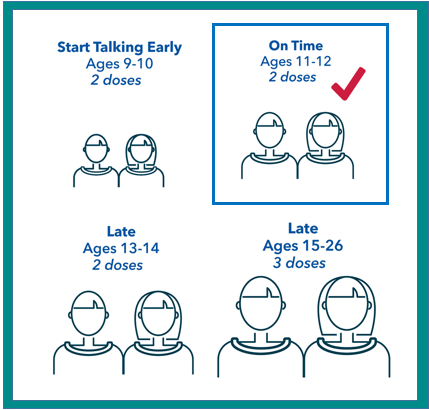HPV Vaccination has been promoted and recommended in the United States by public health officials and medical professionals since 2006. HPV vaccination has been shown to be one of the most effective methods to prevent cancer. Typically, HPV vaccination is strongly recommended for both male and female adolescents aged 11-12 years old, however, catch up vaccination is recommended for males and females up to 26 years old. For adults 27-45 years old, the HPV vaccination may be recommended. ACIP encourages adults 27-45 years old to discuss the HPV vaccination with their doctor to determine whether HPV vaccination is right for them.

We give the vaccine at these ages for three important reasons.
1). Getting your child fully vaccinated before they turn 15 means they only need two HPV vaccine shots. If you wait until they are 15, they will need three shots.
2). HPV vaccine makes a stronger immune response when given younger, which means better protection .
3). Getting all three recommended vaccines (meningitis, HPV, and Tdap) at the same doctors visit means fewer visits for you and your child. Long-term studies have shown that even when given at this age, the immune response against HPV infection is consistent even up to 10 years.
What is the HPV vaccine?
The HPV vaccine is a 9-valent vaccination that protects against HPV infection, which could lead to various HPV-related cancers. The HPV vaccine can be given in either 2-dose or 3-dose combinations, dependent upon the age at initiation. If begun before 15 years of age, only two doses are needed. If given at 15 or later, three doses of the HPV vaccine are needed.
The current version of the HPV vaccine, and most commonly used in the U.S., protects against nine strains of the HPV virus, which can cause related cancers or genital warts.
Is HPV vaccination effective?
Yes. The HPV vaccine is incredibly effective at preventing HPV infections, pre-cancerous cells, and genital warts. Since HPV vaccination's introduction in the U.S. in 2006, HPV strains protected against by the HPV vaccination have seen a 64% reduction in prevalence among teenage girls in the U.S.
Is HPV vaccination safe?
Yes. The HPV vaccination is safe. The ACIP first recommended HPV vaccination in 2006 and has continued to monitor its safety and effectiveness throughout its use. ACIP regularly monitors HPV vaccination and creates recommendations based on the available data presenting its safety and efficacy for various populations.
Why should I vaccinate my child?
The HPV vaccination is one of the only proven methods to prevent HPV infection and HPV-related cancers. It has been proven safe and effective throughout 25+ years of testing and research. The HPV vaccination is strongly supported by public health and medical professionals and is a strategy for protecting adolescents against HPV-associated cancers.
Why is HPV vaccination recommended for 11 or 12-year-olds?
Research has shown that HPV vaccination is most effective when given before HPV exposure. It has also been shown that vaccination at a younger age promotes a more robust immune response to the HPV vaccination, creating more significant protection. There is no reason to wait to vaccinate until your child reaches puberty or starts having sex.
Why are two doses recommended for 9-14-year-olds, but older adolescents still need three doses?
Studies have shown that two doses of HPV vaccination given to adolescents age 9-14 years old worked as well or better than when three doses were given to older adolescents. Therefore, the CDC changed the recommendation in 2016 for this dosing schedule to encourage vaccination uptake at an earlier age to increase vaccination coverage.
Are there side effects of the HPV vaccination?
Similar to any other medicine or vaccination, HPV vaccination can have some mild side effects. Most people who received HPV vaccination experience no side effects at all. Common side effects of the HPV vaccination include: 1) pain, redness, or swelling in the arm where vaccination was delivered; 2) slight fever; 3) headache or feeling tired; 4) Nausea; 5) muscle or joint pain.
The HPV vaccine does not cause HPV infection or cancer. The HPV vaccine is made from one protein from the virus and is not infectious, meaning that it cannot cause HPV infection or cancer.
What is the cost of HPV vaccination?
Depending on your insurance coverage, the cost of the HPV vaccination may vary considerably. Without insurance coverage, the HPV vaccination costs $130-$170 per shot (roughly $390-$500). However, most insurance policies cover the cost of the HPV vaccination. If you, or your child, are uninsured or underinsured, there are various resources available that will assist with the cost of the HPV vaccination. These plans will significantly reduce the cost of the HPV vaccination to you or potentially result in no cost to you.
Are there resources available to help me pay for HPV vaccination?
Various resources will assist you in paying for the HPV vaccination if you do not have insurance coverage or are underinsured. The Vaccines for Children (VFC) program covers the cost of the vaccination for children and adolescents who do not have insurance. The VFC program provides free vaccines to children and teens younger than 19 years of age. VFC covers children and adolescents who are either Medicaid-eligible, American Indian, or Alaska Native or are uninsured. Visit the VFC site for more information.
Where can I get HPV vaccination?
Ask your pediatrician about getting the HPV vaccination for your child. Children, adolescents, and young adults 9 – 26 years old are recommended to receive the HPV vaccination. HPV vaccination can also be received in some states at CVS and Walgreens pharmacies. Various other resources exist around the United States, and the HPV vaccination can also be obtained at Planned Parenthood clinics.
Do health insurance plans pay for the HPV vaccination?
Most, if not all, health insurance plans cover the cost of the HPV vaccination when given according to national guidelines (e.g., within the recommended ages for males and females). To be sure, check with your insurance provider.